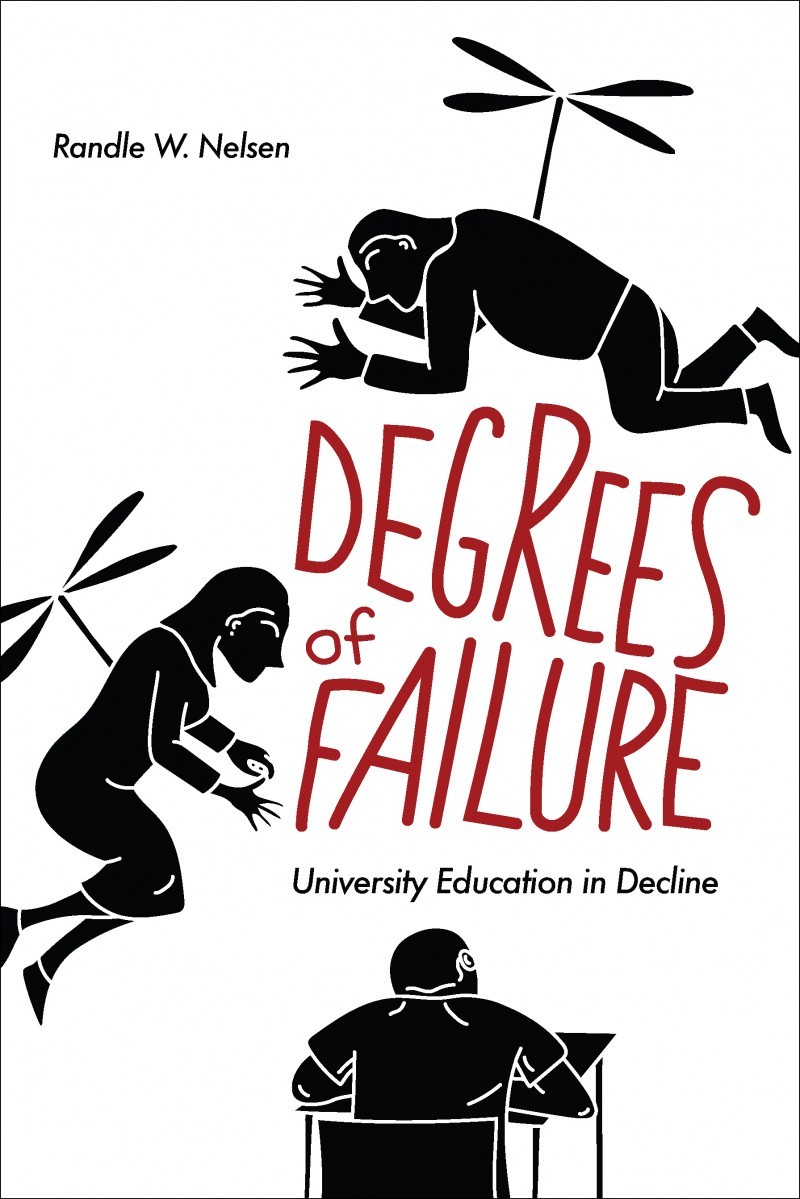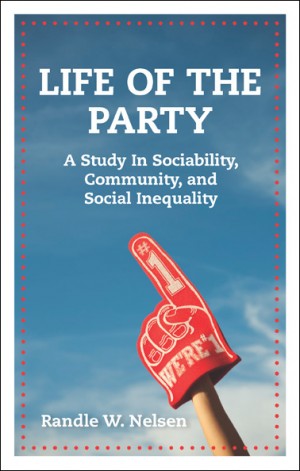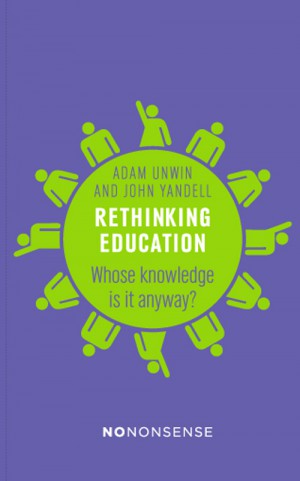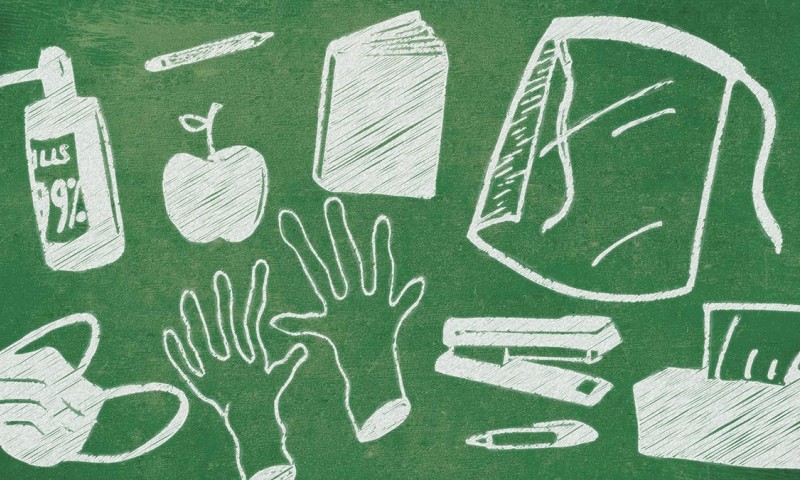
Degrees of Failure
University Education in Decline
In Degrees of Failure, Randle Nelsen brings together such diverse topics as campus parking, college sports, helicopter parents, edu-business as edu-tainment, and technology in teaching to show how continuing inequities, grounded in large part upon social class differences, are maintained and reproduced in our universities.
Paying special attention to the role played by professors in solidifying status quo arrangements, Nelsen makes the strange familiar for those outside the university bureaucracy and the familiar strange for those whose participation in university settings is a routine part of everyday life.
Praise
Nelsen’s analysis of what is wrong with twenty-first-century universities involves a sharp-eyed dissection of much that has become normal, taken for granted, in the routines and priorities of neoliberal higher education – from car parking to curriculum design. There is, though, optimism at the heart of this book—an optimism rooted in the conviction that another university is possible. The alternative entails a fundamentally different approach to knowledge, to learning, and to pedagogy. But this is not some fantasy—as Nelsen’s account demonstrates, it is already within our reach.
– John Yandell, Department of Culture, Communication and Media, University College London Institute of Education, and co-author of Rethinking Education: whose knowledge is it anyway?
As universities tempt potential students and donors with glossy marketing tools and pundits suggest that youth without degrees have bleak futures, Randle Nelsen warns that higher education today is “a morbid mess.” Fundamental educational practices have come to be displaced by priorities associated with business and commodified entertainment. Despite what has been lost, however, Nelsen reminds us that genuine education possibilities can be sustained by drawing upon transformative pedagogical practices that engage participants.
– Terry Wotherspoon, Department of Sociology, University of Saskatchewan
Randle Nelsen drills down deep into the failures of our universities in order to expose the charade of edutainment and edubusiness models of corporate learning that contaminate everything from parking lot access to cheating. Recoiling at the coddled campus he finds populated by intrusive helicopter parents, servile professionals, and facile administrators, Nelsen offers engaging and timely suggestions for reclaiming learning, starting in the classroom.
– Gary Genosko, professor of communication and digital media studies, University of Ontario Institute of Technology
In this thought-provoking and insightful critique Nelsen brings history and the present moment together in readable prose that helps us better understand, and perhaps favorably change, today’s university.
– David E. Hanson, Ph.D., History of Education, Wilsonville, Oregon
Most students today have given up on the utopian dreams of earlier generations and now simply seek certification in order to gain access to what are often disappointing, precarious jobs. This, in turn, has meant deteriorating working conditions for professors, researchers, and instructors whose hopes for critical thinking and creativity in their classrooms have largely been replaced by pragmatism, fierce individualism, and efficiency. Under these circumstances, Randle Nelsen advocates for innovative approaches to higher education, replacing schooling with education and credentialism with critical thinking and analysis. For Nelsen, it’s time to re-embrace creativity and return to the promise of C.W. Mills’ sociological imagination.
– Norene Pupo, professor of sociology, York University
Once again Nelsen has outdone himself. Not only is this text accessible, he keeps it pertinent in the academic sense as he methodically carves the university and college system into its multi-faceted business-based pieces. He has put into print what I have believed for years as I have watched my universities treat me like a consumer instead of a student , and then as a ‘checkout boy’ instead of a teacher. This work stands as, not a cry, but a scream for change, and I hope it fuels the debate to an explosive end.
– Dr. Stephen E. Bosanac, Department of Sociology, York University
A thought-provoking and insightful analysis of the post-secondary education system in North America. Randy Nelsen blends personal experience in the sector with wide-reading and critical research to reflect on the impact of commercialization, technology, and an increasingly managerial culture on the traditional goals of universities in developing and fostering the exchange of knowledge. He makes a convincing argument that these might be reclaimed by prioritizing the interests of students, through problem-based learning, and by closer engagement with the wider community.
– Stephen McBride, professor of political science, McMaster University and author of Working? Employment Policy in Canada
Having written about higher education since before most current students’ parents were students themselves, Nelsen brings a much needed long memory to the work of identifying and understanding the key socio-historical trends currently shaping higher education. For students, professors, staff, or anyone interested in ensuring quality education within our post-secondary institutions, this new book is unsettling.
– Scott Thompson, assistant professor of sociology, University of Saskatchewan
Contents
| Chapter 1 | The University from the Inside-Out: Thoughts of a Participant Observer |
| Chapter 2 | Campus Parking and the Car as a Third Place: Asphalt Grievances and Commuter Sociability |
| Chapter 3 | Parents and Pedagogy: Helicopters and Expert Advice |
| Chapter 4 | Professionals and Professionalism: Protecting the Status Quo and Academic Disciplines |
| Chapter 5 | Edubusiness and Edutainment: Wealthy Benefactors and Sporting Contributions to the Campus Party |
| Chapter 6 | Educators and Education at a Distance: The High-Tech Classroom and the New Mediated Learning |
| Chapter 7 | Classroom Practice and Student-Friendly Suggestions: Up Close and Personal |
| Chapter 8 | Cleaning up the Mess: Putting Students and the Larger Community First |
| Notes | |
| Bibliography |






